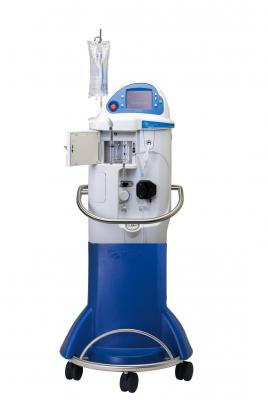
March 20, 2013 — TherOx Inc. announced the initiation of its multicenter investigational device exemption (IDE) pilot clinical study of a second generation system that delivers supersaturated oxygen (SSO2) therapy for reduction of infarct size after an AMI. SSO2 therapy is intended to provide interventional cardiologists with the first treatment option beyond percutaneous coronary intervention (PCI) to salvage heart muscle in heart attack patients.
The first patient was treated by Amr Abbas, M.D., director of interventional cardiology research at Beaumont Hospital in Royal Oak, Mich. Simon Dixon, M.D., chair of cardiovascular medicine at Beaumont Hospital and an investigator for this study, was involved in the previous SSO2 therapy trial, AMIHOT II. He noted, “During AMIHOT II, we found the infarct size reduction achieved by SSO2 therapy was clinically significant. Because of this, I believe SSO2 therapy shows great potential in improving outcomes for high-risk patients.”
According to the American Heart Association, every year approximately 1 million people in the United States have heart attacks. Although PCI is the standard of care in treating AMI, for many patients it does not do enough to reduce infarct size and achieve maximum clinical benefit. SSO2 therapy, adjunctive to PCI, is a solution of highly oxygenated saline mixed with the patient’s blood delivered through a catheter to the targeted ischemic area of the heart. SSO2 therapy is intended to salvage the jeopardized myocardium and thus reduce infarct size.
“Randomized clinical studies show that final infarct size correlates with improved cardiac function as well as mortality in heart attack patients. Further reducing infarct size in heart attack patients is an unmet clinical need which SSO2 therapy may help address,” said Gregg W. Stone, M.D., principal investigator of the SSO2 therapy IDE trial and professor of medicine at Columbia University Medical Center.
“This IDE study is an important milestone toward bringing SSO2 therapy to the U.S. market,” said Kevin T. Larkin, president and chief executive officer of TherOx. “This second generation system improves upon our previous system by making SSO2 therapy easier to administer in the cath lab, and we anticipate even better results than achieved in AMIHOT II.”
The pilot phase of the IDE study will enroll 20 patients in the United States. In addition to Beaumont Health System, the other principal investigators and centers involved in the study are:
- Shukri David, M.D., at Providence Hospital Cardiology in Detroit
- Chris Metzger, M.D., at Wellmont CVA Heart Institute at Holston Valley Medical Center in Kingsport, Tenn.
- David Rizik, M.D., at Scottsdale Heart Group in Scottsdale, Ariz.
A heart attack is typically caused when blood and oxygen flow to the heart is blocked or reduced. If not quickly restored, irreversible damage to the heart muscle, or infarction, will occur. SSO2 therapy is designed to reduce infarct size by boosting oxygen delivery to the heart muscle immediately after the coronary artery has been opened by PCI. The TherOx system creates SSO2 therapy by mixing highly oxygenated saline with the patient’s blood and delivers it through a catheter directly to the targeted ischemic area of the heart.
The first generation system to deliver SSO2 therapy received the CE mark and was successful in meeting the safety and effectiveness endpoints in the AMIHOT II trial. Statistical results from the AMIHOT II trial of SSO2 therapy, together with PCI and stenting, demonstrated a relative reduction of 26 percent in infarct size compared to PCI and stenting alone. In addition, the finding of device effectiveness was supported by additional analyses that showed a 53 percent increased likelihood of having a small (less than 5 percent damage of the left ventricle) infarct among SSO2 therapy patients. The results were published in Circulation: Cardiovascular Interventions.[1]
This second generation system being studied builds on the success of AMIHOT II and includes the additional benefits of shortening the treatment time to 60 minutes and broadening the treatment area to the entire left coronary system so that no ischemic area goes untreated. SSO2 therapy is consistent with the 90-minute door-to-balloon initiative and supports the current guidelines for interventional cardiology procedures.
In the United States, SSO2 Therapy is delivered by an investigational device. It is limited by United States law to investigational use. It is not for sale or distribution in the United States.
Reference:
1. Stone GW, Martin JL, Boer MJ, et al. "Effect of Supersaturated Oxygen Delivery on Infarct Size After Percutaneous Coronary Intervention in Acute Myocardial Infarction." Cir Cardiovasc Interv 2009;2:366-75.


 January 05, 2026
January 05, 2026 









